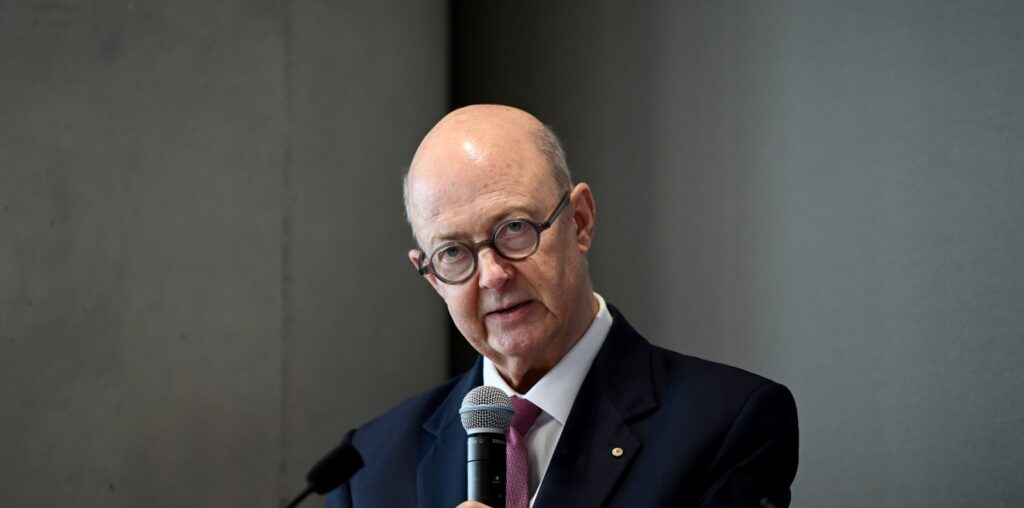While the changes to the ABC’s 2025 Radio National line-up reverberated around Ultimo on Thursday, Kim Williams addressed a group of business leaders in the broadcaster’s headquarters on the issue of ethical leadership.
The ABC was rocked on Thursday by the news that ABC Sydney Mornings host Sarah Macdonald, along with weekend presenter Simon Marnie, didn’t have their contracts renewed. Former Seven and Ten presenter Chris Bath was also announced as the replacement for Drive presenter Richard Glover.
Current and former ABC figures took to social media, with outgoing Media Watch host Paul Barry describing Macdonald as “one of the best things on radio”, while former ABC reporter Emma Alberici said she was “utterly gobsmacked”.
Crikey understands Macdonald’s departure came as a shock to staff at the ABC, with an ABC staffer telling Crikey morale was “at an all-time low”, given Macdonald and Marnie’s status as “two of the most loved members of staff”. Tears were said to have flowed in Ultimo as news of Macdonald’s departure circulated.
While giving the Vincent Fairfax Oration for the Cranlana Centre for Ethical Leadership (of which he is a former chair) on Thursday night Williams referenced historian Timothy Snyder’s book On Tyranny in underlining the importance of professional ethics.
Williams, in passing, took a veiled swipe at the “string of scandals relating to the conduct and ethics of large, prominent, respectable Australian enterprises, led by highly-compensated professionals, ranging from management consulting firms to leading banks, from aviation to big supermarkets”.
“We might also note that these scandals have rarely affected the public reputations and careers of those involved, certainly not in any meaningful way. It’s as if these acts of malfeasance are relatively harmless,” Williams said.
A Q&A session following the address, however, brought the issue of the day to the fore.
Moderator Matt Beard warned the audience (filled with high-society members of the Fairfax and Myer families) ahead of time that long-winded comments or questions on the management of the ABC were welcome to be aired elsewhere, appearing to anticipate that the news of Macdonald’s departure may raise prickly questions for Williams.
Instead of having to face the music on staff movement at the national broadcaster, Williams fielded questions about the US election and whether there were lessons to take from Republican Donald Trump’s victory.
“First is that there was a peaceful transition from one side of politics to the other … and the Democratic side of politics will do that gracefully and constitutionally. I would assert that was not what happened when Joe Biden won the election,” Williams began.
“I think it’s also a very useful lesson in the power of words and the power of fear, and I would encourage people to look as objectively as possible at all of the contributing factors that resulted in the election of President-elect Trump. I would not be truthful with you if I did not pass comment on the fact that clearly, there were many known, prosecuted lies on an industrial scale in that election, and we should all take note of that.”
Another question on the US election prompted Beard to steer questions back to the content of Williams’ speech. One question about how deeper issues can be tackled in an age of attention deficits and short-form journalism prompted Williams to wax lyrical about the golden age of the app once known as Twitter.
“It’s very clear to me that the majority of people who had views about the product once known as Twitter rarely used it and did not understand it, because the majority of tweets were in fact not 140-character offerings [but] … links to other things … a wide variety and diversity of articles, scholarly papers, independent journalistic offerings. It was one of the first promoters of independent, user-generated, serious journalism. And that’s certainly what happened during the Arab Spring,” Williams said.
“I think X is just a running sewer of rubbish, but Twitter was actually an enormously compelling place, and it was predominantly giving access to a very wide variety of deep thinking … and it was a very democratic space … I actually found that quite addictive, and became a big user of Twitter,” he said.
Williams is due to address the National Press Club in Canberra on November 27.
Have something to say about this article? Write to us at letters@crikey.com.au. Please include your full name to be considered for publication in Crikey’s Your Say. We reserve the right to edit for length and clarity.

